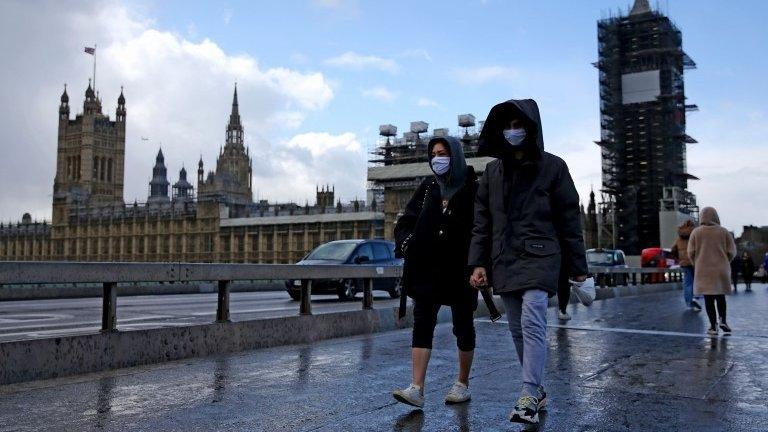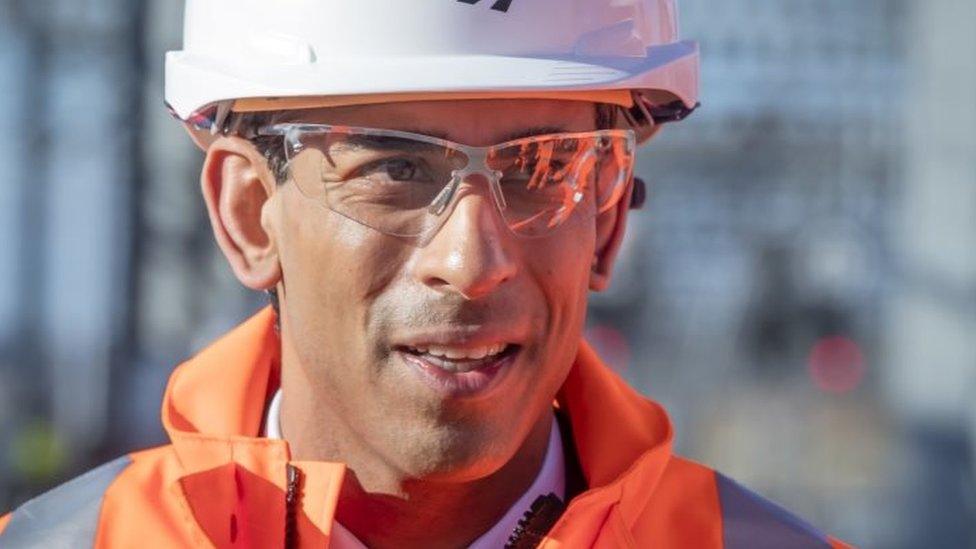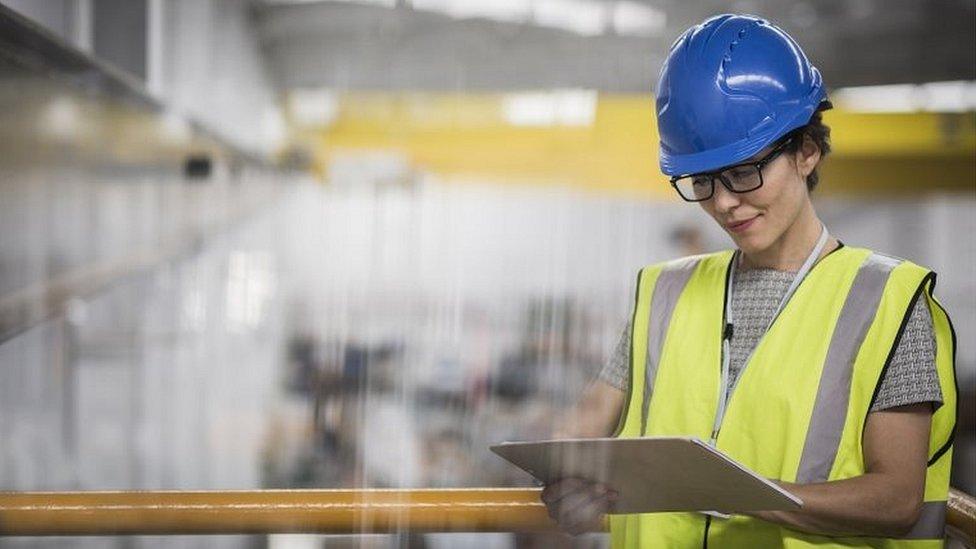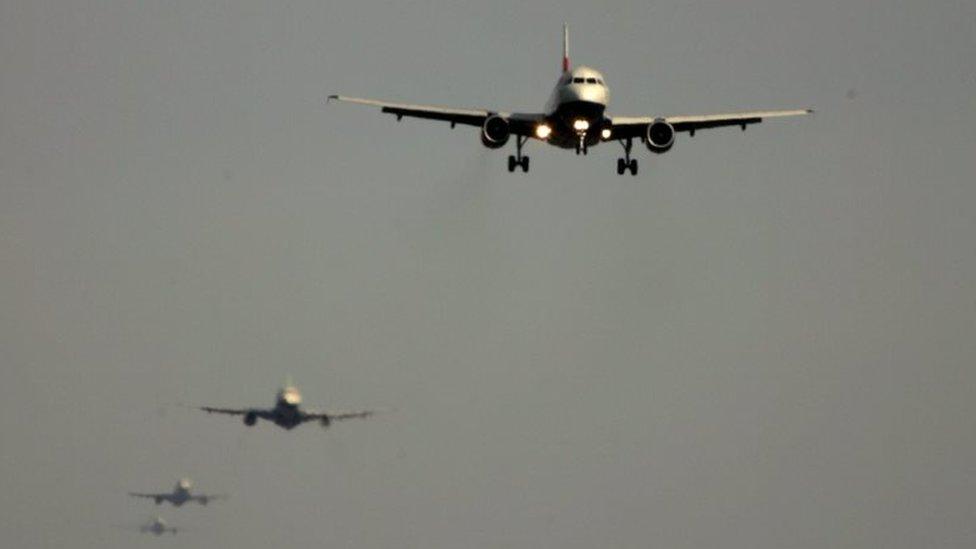The week ahead in Parliament
- Published

The known agenda for the coming week is dominated by the Budget - with two days of debate in the Commons, and one in the Lords.
But the probability is that the main event will be continuing updates on the coronavirus - through ministerial statements.
And behind the scenes the debate will continue about how Parliament might have to modify its working methods. Might there be more remote working and paper-based voting, rather than the traditional trooping through the lobbies?
Interestingly, the provisional Commons timetable for the week after next allocates two days for "second readings of a bill" on 23 and 24 March - suggesting that this is when the promised emergency legislation will land.
Two days of second readings seems to imply there are two bills being presented by the government - doubtless after talks with the opposition parties to speed them through.

Rishi Sunak's first Budget comes under further scrutiny
Meanwhile, the Budget Ways and Means resolutions - the changes announced by the chancellor - are expected to be agreed on the conclusion of the Budget debate, on Tuesday, with the resulting Finance Bill brought in shortly afterwards and read the first time, with second reading (like all government bills) announced "tomorrow".
The tax changes will have provisional effect for seven months provided that the Finance Bill gets through its second reading within 30 sitting days of the decision on Tuesday. In a normal year the second reading could quite plausibly come after Easter, in late April, but it could well be earlier under current circumstances - so there's little danger the government will lose its right to tax.
Here's my rundown of next week's (scheduled) business:
Monday 16 March

Does the UK have the skills it needs?
The Commons opens (14:30) with an hour of Defence Questions - after which expect the usual crop of post-weekend ministerial statements and urgent questions.
The day's Ten Minute Rule Bill, from Labour MP Alex Norris, is on making assaults on retail workers aggravated offences, opening the way for tougher sentencing.
That is followed by the continuation of the Budget debate.
On the Committee Corridor, the Treasury Committee launches its usual inquiry into the Budget, opening with evidence (16:00) from a panel of economists including Torsten Bell of the Resolution Foundation, Diane Elson of the University of Essex and the Women's Budget Group, Paul Johnson of the Institute for Fiscal Studies and Linda Yueh of Oxford University and London Business School.
In the Lords (14:30), questions to ministers cover whether the education system is structured to deliver a workforce equipped with the right skills, the economic impact of a new system for the regulating chemicals and the use of live facial-recognition technology, whether the watch lists for such are composed exclusively of serious criminals.
That's followed by a debate on the opening of negotiations with the UK for a new partnership agreement with the EU. Labour's Baroness Hayter has an amendment down calling for the creation of a parliamentary committee with access to sensitive information so that it could report on the final agreement, and hear updates from ministers on the progress of the talks. The motion notes that the European Parliament will have such an arrangement so that the EU Commission keeps MEPs informed.
Tuesday 17 March
Commons business opens (11:30) with an hour of Foreign Office Questions. Then former cabinet minister Karen Bradley presents a Ten Minute Rule Bill to require companies to prepare an annual statement on carbon in their supply chains.
Her bill lifts the wording of section 54 of the Modern Slavery Act 2015, which requires large companies to make a statement on their websites regarding the action they have taken to identify and eliminate slavery in supply chains and applies the same requirement to carbon emissions in supply chains. The idea is to highlight what action businesses are taking to ensure their supply chains are carbon-neutral.
And that's followed by the conclusion of the Budget debate - and those Ways and Means resolutions to put the Budget measures into operation.
In Westminster Hall, Conservative Fiona Bruce leads a general debate on tackling alcohol harm (09:30).
On the Committee Corridor, the Defence Committee (14:30) hears from former Defence Secretary and Secretary General of Nato Lord Robertson of Port Ellen, former National Security Advisor Lord Ricketts and former Chief of the Defence Staff Lord Stirrup on the government's Integrated Security, Defence and Foreign Policy Review.
Elsewhere, the Treasury Committee continues its yomp through Budget 2020 with officials from the watchdog body, the Office for Budget Responsibility, including its Chair, Robert Chote (09:30).
In the Lords (14:30) question time sees former Education Secretary Lord Blunkett asking about publishing the outcome of the government's departmental review into children with special educational needs.
Then peers move on to the report stage consideration of the Divorce, Dissolution and Separation Bill - crossbencher Baroness Howe wants to add a requirement for a regular report to Parliament on the effect on children of divorce in families with low conflict over the end of their marriage.
Next comes the second reading of the Private International Law (Implementation of Agreements) Bill - to implement the Hague Conventions of 1996, 2005 and 2007 and to provide for the implementation of other international agreements on private international law.
This covers, for example, child maintenance obligations imposed by a court in one state so that they can be enforced in another state; divorces being recognised in other countries; and businesses feeling confident entering into cross-border transactions knowing that, in the event of a dispute, there is a clear mechanism for deciding how it will be resolved and the outcome respected in different countries.
Meanwhile, the Lords Science and Technology Committee (11:20) continues its fascinating inquiry into the science of ageing, with evidence on technology and healthy living, with a variety of experts and practitioners.
Wednesday 18 March
The Commons gets under way (11:30) with a debut appearance by new Northern Ireland Secretary Brandon Lewis for half an hour of question time, before the prime minister takes to the Dispatch Box at 12:00.
The day's Ten Minute Rule Bill, from Labour lawyer Bambos Charalambous is the Children (Access to Treatment) Bill - also known as "Charlie's Law". The Bill follows the tragic case of Charlie Gard, who died in 2017 following distressing legal conflicts between his parents and medical professionals over his treatment.
It would create a new legal test - building upon current best-interest framework to ensure that treatment options can only be prevented by court order where they risk significant harm. If another reputable institution is willing to provide the treatment, and the harm threshold isn't reached, the treatment could be obtained.
Then the SNP's Margaret Ferrier will present a bill on banning charges for cash machines.
The main debate will be on a Labour motion to be announced.
My Westminster Hall picks are Grahame Morris's debate on the health and safety for prison staff (09:30) and Alicia Kearns' debate on organised crime in rural areas (16:00).
On the Committee Corridor, the Treasury Committee's Budget 2020 inquiry culminates in evidence from Chancellor Rishi Sunak (14:15).
In the Lords (15:00) questions include Lord Bassam of Brighton, who led a select committee inquiry into the problems facing seaside towns, asking about assisting universities and FE colleges to address issues with higher education provision in rural and coastal areas.
Then peers hold their debate on the economy in the light of the Budget.
Former Bank of England Governor Mark Carney is at the EU Financial Affairs Sub-Committee (10:00) in his new role as UN Special Envoy for Climate Action and Finance. He'll be discussing COP26 - the climate change conference due to be hosted by the UK.
Thursday 19 March

Air travel safety is on the agenda
MPs get under way (09:30) with forty minutes of Environment, Food and Rural Affairs Questions, starring newly-promoted Secretary of State, George Eustice.
At 10:10 there are mini question times for the MPs who speak on behalf of the Church Commissioners, the House of Commission, the Public Accounts Commission and the Speaker's Committee on the Electoral Commission.
The main debates are on two subjects chosen by the Backbench Business Committee, first, on a motion on the government response to the Morse review of the Loan Charge.
Then there is a general debate on Horizon settlement and future governance of Post Office Ltd - this is the continuing row over the Post Office accounting system, which led to criminal prosecutions and even wrongful imprisonment of sub postmasters, and the level of compensation now being offered to them.
In the Lords (11:00) questions include the challenge of county lines drug trafficking and the requirement for religious marriages to be legally registered.
The main debates are on subjects chosen by backbench Labour peers - first Lord Pendry on the problems facing the citizens of Hong Kong as a result of Wuhan coronavirus; and the case for providing support to those affected in the light of the 1984 Sino-British Declaration.
Then there's Lord Robertson of Port Ellen on the UK's progress towards United Nations Sustainable Development Goal 3 and, in particular, the target of halving global road deaths and injuries from road traffic accidents by 2030.
Between them there will be a short debate on the government decision not to participate in the European Aviation Safety Agency and its plans to address any gap in regulatory oversight.
Friday 20 March
Neither House sits.
